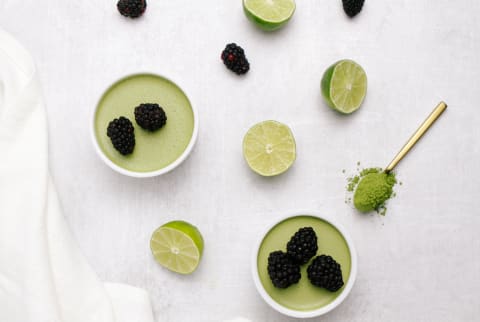Advertisement
This Matcha Pudding May Help Fight Inflammation & Anxiety, According To An RD


At mbg, we place the utmost importance on mind-body balance (we're mindbodygreen, after all!). That's why we're excited to feature an excerpt from The Anti-Anxiety Cookbook by Ali Miller, R.D., L.D., CDE, as she provides a simple, yet effective approach to cultivate this mind-body balance and to eat for optimal health. The food therapy in her book focuses on fueling the body with vitamins, minerals, antioxidants, and amino acids in order to provide building blocks for neurotransmitters as signals in the brain that help to manage mood, reduce cravings, and resolve anxiety. Although the science may sound complicated, you'll find that her lifestyle guide is quite straightforward and her recipes (one's featured here!) are oh-so-yummy. To read more about how your diet can help rebalance your neurotransmitters, check out Miller's excerpt below.
First, what are neurotransmitters?
The central nervous system releases billions of neurotransmitters, all of which function as biological signals orchestrating a symphony in the brain. They regulate mood, perception, cognitive processing, and many daily functions. Protein compounds called amino acids are the building blocks of neurotransmitters. They combine in the presence of specific enzymes and cofactor nutrients.
Neurotransmitters also play a key role in managing inflammation and cognition and driving many autonomic nervous system functions. To complicate matters, the neurotransmitters of the central nervous system communicate directly with those produced in the gut via the enteric nervous system, which has more neurons than the central nervous system, including the brain and spine, combined. This is how probiotics can be seen as nature's Prozac as 90% of your body's serotonin is produced in your intestines.
Neurotransmitters are categorized as either excitatory, stimulating neuron firing, or inhibitory, reducing neuron activity. The stress-responding excitatory neurotransmitters made by the adrenal glands are known as catecholamines. These include dopamine, norepinephrine, and epinephrine to respond in fight-or-flight mode.
Beyond serotonin, GABA is an inhibitory neurotransmitter known for regulating anxiety and depression. GABA is a major chill pill of the brain, inhibiting anxiety and reducing physiological response to stress. Beyond balancing mood and mellowing out the mind, GABA can have anti-inflammatory effects on the gut itself, thus reducing the response of inflammatory chemicals and compounds. It can lower epinephrine, which in excess can drive panic, worry, irritability, and distress.
What does this mean for you?
A diet rich in amino acids tryptophan, tyrosine, and glycine will increase GABA production and have a calming effect. This includes clean sources of pasture-raised poultry and pork, grass-fed beef, as well as bone broth, gelatin, and pork skins.
Remember: Ensure you're consuming ample protein to provide foundational amino acid support! Wild-caught fish or grass-fed, pasture-raised meats provide a higher-quality source of nutrients without taxing the body with high amounts of proinflammatory compounds found in conventional sources.
How to optimize your neurotransmitter levels:
- Eat enough protein. Aim for ½ gram of protein per pound of body weight as a daily minimum.
- Provide your gut with probiotic-rich foods including cultured vegetables, nondairy yogurts, and fermented foods.
- Support utilization and absorption of protein with digestive enzyme support, such as Naturally Nourished Digestaid
- Get seven to nine hours of sleep a night.
- Practice deep breathing.
- Adjust environment to reduce stress and learn to say no.
- Practice perspective and gratitude.
- Reduce screen time and wear blue blockers, or special lenses that block blue light. Electronics and blue light burn out your dopamine.
- Consider amino acid supplementation such as tryptophan, tyrosine, L-theanine, and serine.
A recipe to rebalance your neurotransmitters: Matcha Lime Pudding With Blackberries
Start your day with this creamy, zesty pudding that blends grassy matcha tea powder with the light, bright acidic notes of lime and blackberries. Matcha provides L-theanine, an amino acid compound that supports a mellow alertness and aids in alpha brainwave expression. Eat as a dense snack or a light meal—you can easily bulk up with additional toppings, such as chopped nuts, coconut shreds, or hemp seeds.
Makes: 4 (½-cup) servings | Prep time: 5 to 10 minutes | Set time: 8 to 10 hours
Ingredients:
- 1 (13.5-ounce) can full-fat coconut milk
- 1 tablespoon lime zest
- 2 tablespoons lime juice
- ½ teaspoon lemon extract or lemon juice
- 1 tablespoon gelatin
- 1 cup fresh blackberries
- 2 teaspoons matcha tea powder
- 1 tablespoon honey
Method:
- Combine all the ingredients except the blackberries in a blender and mix on high for 1 minute. Let rest for 5 minutes to bloom the gelatin, then blend on high for 1 additional minute.
- Divide the pudding into 4 ramekins or Mason jars and refrigerate for 8 to 10 hours or overnight.
- Top each ramekin with about ¼ cup blackberries prior to serving.
Nutrition facts per serving:
- Calories: 232
- Carbohydrates: 12 g
- Fiber: 3 g
- Protein: 6 g
- Fat: 18 g
Excerpted from The Anti-Anxiety Cookbook by Ali Miller, R.D., L.D., CDE ,with the permission of Ulysses Press Copyright © 2019.